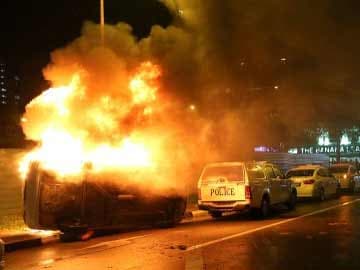
The riot on the night of December 8, 2013, was sparked by the killing of an Indian national in a bus accident at Singapore's Little India.
AFP Photo
Singapore:
A new law came into effect today, giving the Singapore police and authorities power to maintain public order and calm in Little India, the scene of the worst riot in 40 years in the city state.
The law will be effective for a year in the district, where some 400 migrant workers from South Asia rioted when an Indian man was killed in a bus accident on December 8. It replaces existing measures invoked on a weekly basis since the riot last year.
From now, any public assembly held within a demarcated zone of Little India would require a police permit, even if held indoors.
The indoor meetings held by places of worship, societies and other organisations involving their own members would be exempted from the revised law, given that the precinct has a number of temples and societies serving the local public.
With the Public Order (Additional Temporary Measures) Act in place, it would no longer be necessary for the government to invoke the Public Order (Preservation) Act to proclaim Little India as an area in a state of danger to public order during weekends, public holidays and their eves, which had been done since 8 December 2013 following the riot,Singapore's Ministry of Home Affairs said.
The new law gives police a focused set of powers, and lets the authorities "continue to take calibrated measures to maintain public order in Little India", the ministry said in a statement yesterday.
The wide-ranging powers under the earlier Act "will no longer apply to Little India henceforth," it added.
With the change, police would no longer be able to impose curfews, impose reporting requirements on persons or use deadly force on subjects who resist arrest, among other things.
But the state has maintained restrictions on supply and consumption of alcohol in Little India, which had been imposed after the riot.
The police can also suspend or revoke a range of permits and licences on short notice if a licensee flouts the alcohol ban.
After the new law expires in 12 months, new longer-term measures would be introduced, taking into account the recommendations of the state-appointed Committee of Inquiry which was looking into the various causes of riot, The Straits Times reported.
The last year's riot left 43 police officers injured and 24 emergency vehicles damaged in the worst outbreak of violence Singapore has seen in the last four decades.
The law will be effective for a year in the district, where some 400 migrant workers from South Asia rioted when an Indian man was killed in a bus accident on December 8. It replaces existing measures invoked on a weekly basis since the riot last year.
From now, any public assembly held within a demarcated zone of Little India would require a police permit, even if held indoors.
The indoor meetings held by places of worship, societies and other organisations involving their own members would be exempted from the revised law, given that the precinct has a number of temples and societies serving the local public.
With the Public Order (Additional Temporary Measures) Act in place, it would no longer be necessary for the government to invoke the Public Order (Preservation) Act to proclaim Little India as an area in a state of danger to public order during weekends, public holidays and their eves, which had been done since 8 December 2013 following the riot,Singapore's Ministry of Home Affairs said.
The new law gives police a focused set of powers, and lets the authorities "continue to take calibrated measures to maintain public order in Little India", the ministry said in a statement yesterday.
The wide-ranging powers under the earlier Act "will no longer apply to Little India henceforth," it added.
With the change, police would no longer be able to impose curfews, impose reporting requirements on persons or use deadly force on subjects who resist arrest, among other things.
But the state has maintained restrictions on supply and consumption of alcohol in Little India, which had been imposed after the riot.
The police can also suspend or revoke a range of permits and licences on short notice if a licensee flouts the alcohol ban.
After the new law expires in 12 months, new longer-term measures would be introduced, taking into account the recommendations of the state-appointed Committee of Inquiry which was looking into the various causes of riot, The Straits Times reported.
The last year's riot left 43 police officers injured and 24 emergency vehicles damaged in the worst outbreak of violence Singapore has seen in the last four decades.
Track Latest News Live on NDTV.com and get news updates from India and around the world

